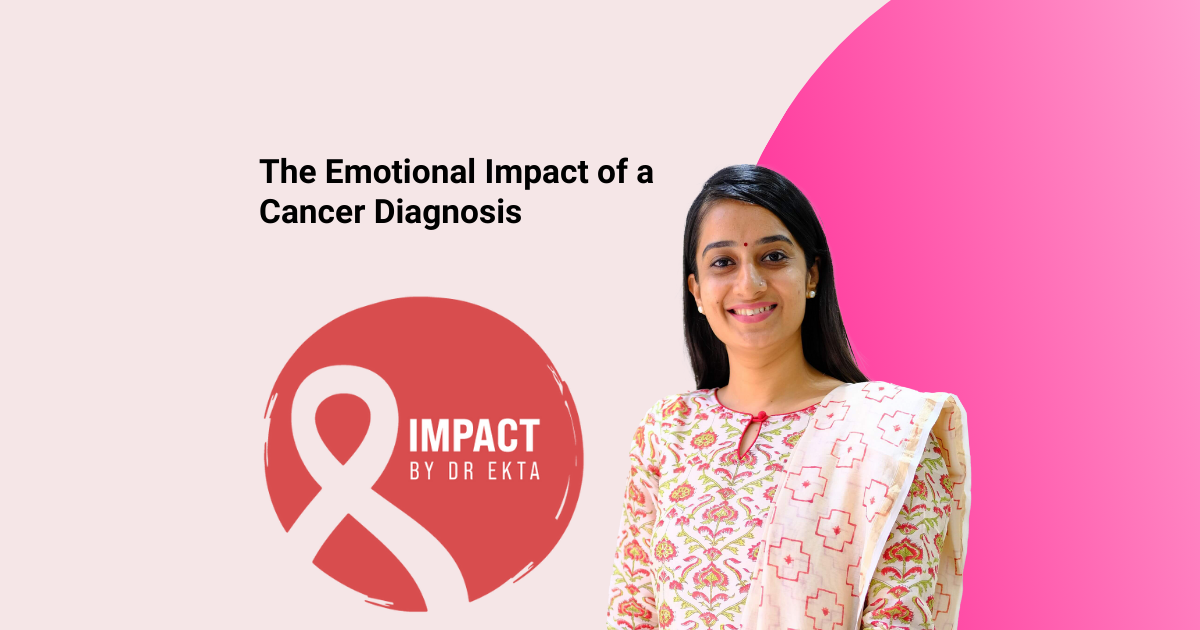As an oncologist, I encounter the profound emotional challenges that accompany a cancer diagnosis every day. While medical treatments and clinical outcomes are crucial aspects of cancer care, it’s equally important to recognize and address the emotional impact that such a diagnosis has on patients and their families. In this blog, I will share insights into the emotional journey that often follows a cancer diagnosis and offer guidance on how to navigate this complex terrain.
Understanding the Initial Shock
When I first deliver a cancer diagnosis, I often witness a wave of emotions. Shock and disbelief are common reactions. For many, the words “You have cancer” seem surreal, as if time has momentarily frozen. This initial shock can be overwhelming, and it’s normal for patients to feel a range of emotions, including numbness, confusion, and fear.
The moment of diagnosis is often a whirlwind of information. Patients might struggle to process the details of their condition, the treatment options, and the implications for their future. It’s crucial during this time to provide clear, compassionate communication and ensure that patients have the support they need to absorb the news and begin to make decisions about their care.
Navigating Fear and Anxiety
Fear and anxiety are natural responses to a cancer diagnosis. Patients frequently worry about the unknown—what the future holds, how the cancer will affect their life, and whether their treatment will be effective. The uncertainty about the progression of the disease and the potential side effects of treatment can amplify these feelings.
One of my roles is to help patients manage their anxiety by providing them with accurate information about their condition and the steps involved in their treatment. Knowing what to expect can alleviate some of the fear and help patients feel more in control of their situation.
Experiencing Loss of Control
A cancer diagnosis often brings about a profound sense of loss of control. Patients may feel as though their life has been turned upside down, with treatment schedules, hospital visits, and medical decisions taking over their daily routine. This loss of control can lead to frustration, sadness, and a sense of helplessness.
I encourage patients to focus on the aspects of their lives that they can control. Whether it’s making decisions about their treatment, seeking a second opinion, or maintaining their daily routines as much as possible, taking control in small ways can help counteract feelings of helplessness. Additionally, involving loved ones in decision-making and care can provide emotional support and a sense of partnership in the journey.
Coping with Changes in Self-Image
Cancer and its treatment can significantly impact a person’s self-image. The physical changes brought about by surgery, chemotherapy, or radiation therapy—such as hair loss, weight changes, or scars—can affect how patients see themselves and how they believe others see them.
It’s important to address these changes openly. I often encourage patients to discuss their concerns with a counselor or support group, where they can share their feelings and find others who have experienced similar challenges. Embracing these changes and finding ways to adapt can be a crucial part of the healing process.
The Role of Support Systems
The emotional burden of a cancer diagnosis is not borne by patients alone; their families and loved ones are also deeply affected. Caregivers often experience stress, anxiety, and emotional exhaustion as they support their loved ones through treatment. Open communication within families is essential to ensure that everyone’s feelings are acknowledged and supported.
I often recommend that patients and their families seek out support groups or counseling services. Connecting with others who have gone through similar experiences can provide comfort, advice, and a sense of community. Professional support services can also help patients and families develop coping strategies and manage the emotional challenges of cancer treatment.
Managing Depression and Isolation
It’s not uncommon for patients to experience depression or feelings of isolation following a cancer diagnosis. The stress of dealing with the disease, coupled with changes in daily life and social interactions, can contribute to these feelings. It’s important to recognize and address these symptoms early on.
I encourage patients who are struggling with depression to seek professional help. Mental health professionals can offer therapy and, if necessary, medication to help manage these feelings. Additionally, maintaining social connections and engaging in activities that bring joy and relaxation can help combat feelings of isolation.
Finding Hope and Resilience
Despite the emotional challenges, many patients find strength and resilience through their cancer journey. Focusing on personal goals, celebrating small victories, and finding meaning in the experience can help patients maintain a positive outlook.
I often remind my patients that each individual’s journey with cancer is unique. While it’s important to acknowledge and address the emotional impact, it’s also vital to celebrate the progress made and the support received. Finding hope and resilience can be empowering and provide a source of strength throughout the treatment process.
Moving Forward
The emotional impact of a cancer diagnosis is profound and multifaceted. It affects not only the individual diagnosed but also their loved ones. By acknowledging the emotional challenges, seeking support, and focusing on aspects of control and resilience, patients and their families can navigate this difficult journey with greater ease.
As an oncologist, my role extends beyond medical treatment to include emotional support and guidance. I strive to provide a compassionate and supportive environment where patients feel understood and empowered to face their diagnosis.
Remember, you are not alone in this journey. Support is available, and together we can navigate the emotional landscape of cancer with strength and hope.

